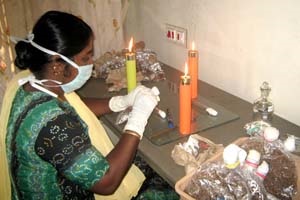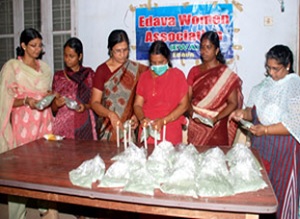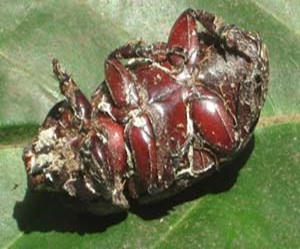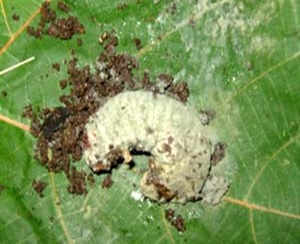Eco- Friendly Management of Coconut Pests
Rhinoceros beetle (Oryctes rhinocerosLinn.), popularly known as black beetle, is a major pest of coconut in all coconut growing states. It affects seedlings, juveniles and adult bearing palms and leads to reduction in growth and yield by damaging unopened inflorescences in bearing palms. The adult beetle lays eggs in cow dung pits, vermicompost units, coir pith, degraded coconut logs etc. Treatment of such breeding sites with green muscardine fungus (GMF),Metarhizium anisopliae, developed by ICAR-Central Plantation Crops Research Institute, Regional Station, infest different stages of grubs within a week and thus, effectively brings down the population of the pest. Incorporation ofClerodendron infortunatum, a common weed seen in coconut gardens, in the breeding sites also inhibits the growth stages of the black beetle.
Technology
Low level of awareness of the technology among the farming community along with non- availability of sufficient quantities of GMF were the major obstacles in the adoption of the environment friendly and effective bio management technologies. To address these issues, CPCRI, Regional Station, Kayamkulam has successfully implemented an Area Wide Community Adoption (AWCA) programme. As per the CPCRI technology, the fungus could be easily multiplied at farm level by simple and cheap methods using rice grains, tapioca chips and coconut water. Its production was decentralized through farm level GMF multiplication units by trained farm women groups. The capacity building and skill up gradation of the units were done by the CPCRI scientists, as a continuous process of confidence building. Effective linkage and building up of network with relevant stake holders like Department of Agriculture, coconut farmers’ groups, Veterinary Department, Milk co-operative societies, farmers, mass media, local panchayat etc. were developed for rapid spread of technology and multiple level of interventions
Model
The model implemented in Edava Gram Panchayat in 520 ha of coconut area during 2010-13 proved effective in field situations and enabled rapid spread and utilization of technology in other areas. Taking cue from the success, approximately 4,000 ha of area in Thekkekara, Devikulangara, Krishnapuram, Bharanikkavu and Edava panchayaths of Alappuzha and Trivandrum districts of Kerala were brought under the programme during 2014-15. Two-three women groups of 12-15 members in each ward were involved in technology transfer activities and treatment of breeding sites, thus mobilizing a total of 150-200 women representing each panchayaths in popularizing and adopting the technologies.
By ensuring hygienic conditions and training support a unit can be started in an ordinary room. The initial cost of setting up of the unit comes to Rs.8,000 to Rs. 10,000. The basic items required are a pressure cooker (20 l capacity), culture of GMF, polypropylene covers, quality rice and other accessories like cotton, aluminum foil, thick candles, hand gloves etc. The rice is half cooked and after cooling, filled in polypropylene covers and the covers are sterilized in pressure cooker. Thick candles are lighted in the work table to keep the area free of contaminants and culture of GMF is added into the cover and thoroughly mixed. Such covers are kept at room temperature for about a week for the fungus to multiply. For application, mix one packet of GMF with one litre of water and sprinkle over the breeding sites. The beetle grubs could be found dead in a week time. Such treatment of breeding sites is to be done only once in an year.
Outreach
While planning for Panchayat-wise community adoption programmes, as first step, map all the potential breeding sites of rhinoceros beetles in each ward and treat with GMF as a one week campaign with the active involvement of various stake holders. As the production cost of one packet (100g) of GMF is only Rs.20, this programme, requires only Rs.20,000 to 25,000 per Panchayat. The impact analysis of this programme indicated 70 to 80% reachability to the potential adopters and 75% reduction in fresh incidence of rhinoceros beetle especially in the bearing palms, thus, reducing the yield loss to farmers. Participation and functional linkages at grass root level could influence the technology utilization in a positive and effective manner and that is the message of the activities facilitated by CPCRI, Regional Station, Kayamkulam.
(Source: ICAR-Central Plantation Crops Research Institute, Kasargod)



